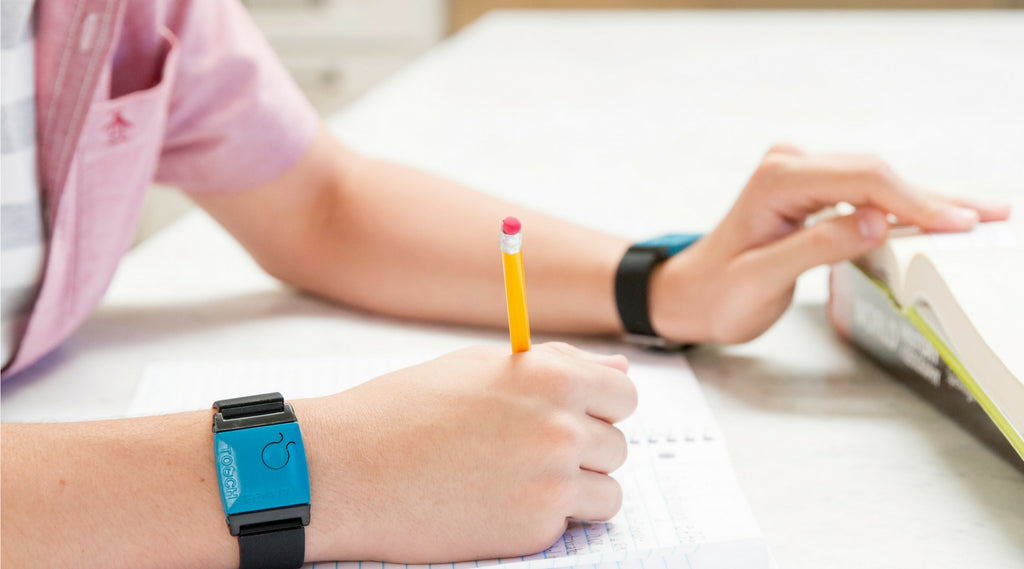How To Help Ease Your Child's Anxiety When They're Heading Back To School

Guest Blog by Janice Killey
Going to an unknown place for the first time can be anxiety inducing experience. The fear of the unknown and the mysterious keeps us on our toes; anticipating, disturbed, worrying.
The same applies for heading back to school whether as a preschooler or a regular student. There are just too many variables involved – new teachers, new classmates, new classrooms – and that’s bound to make anyone anxious!
Some kids find this change exciting while others feel heading back to school a daunting task leading to anxiety. Both these feelings are perfectly normal. But if your child is feeling anxious, you can help them recognize their anxiety as well as how to deal with it. Let’s get started.
Signs of Anxiety to Look For in Your Child
If your child is heading back to school or joining school then these are some of the symptoms of anxiety to look for.
- Disturbance in sleep pattern
- Feeling anxious when thinking about going to school
- Clingy behavior and separation anxiety in first timers (Pre-schoolers)
- Anxious behavior like nail biting or any other unusual behavior
- Complaining about stomach pains
- Acting irritable, throwing tantrums and/or crying excessively or without reason.
Here are few tips that can enable you to help your child transition successfully and deal with back to school anxiety:
1. Recognize The Issue
Anxiety and being nervous is normal for kids who are heading back to school. But dealing with a sudden change can be hard for your child. In that case, the first step towards helping them is to recognize that their worry is real and demands your attention.
If you recognize symptoms of anxiety in your child like acting out or being nervous, talk to them about it. Discuss with them what “anxiety” is and why they might be experiencing it. Realizing that what they’re feeling, whether anxious or worried, is very normal. Remind them that anxiety is just one of the many emotions a person feels every day and the feeling is just short-term. When the child knows that what they’re feeling is not only normal but also expected, they won’t be as nervous anymore.
2. Acknowledge Their Worries
As soon as you recognize the emotion, have a conversation with your child about why they’re feeling anxious. Perhaps it’s the fear of meeting new class mates, increased workload or something else such as bullying. When they do share their concerns with you, listen to them and acknowledge their worries instead of dismissing them as something normal or common. Their worries are going to seem trivial to you but for them, they are all consuming and important.
Acknowledging their feelings will help your child feel more secure and also give them the confidence to cope with the anxiety.
3. Help Them Manage Their Anxiety
Feelings of anxiety activate the fight or flight response in a person in reaction to a present or anticipated threat. Symptoms of anxiety include:
- Increased heartbeat
- An upset stomach
- Shallow breathing and tightness in the chest
- Sweaty palms
To help your child manage their anxiety better, they need to understand that feeling nervous and anxious is a normal response and they can easily cope with it. Anxiety is more of a physiological reaction than a psychological one. To help your child:
- Educate them about anxiety and teach them how slowing down the fight and flight reaction will help alleviate the symptoms of anxiety.
- Teach them stress reducing exercises like “deep breathing” and “counting backward from 10.”
- Practice with them how to do the deep breathing exercise until it becomes a habit.
- Discuss possibilities and situation where they are prone to feeling anxious like taking a big test or introducing themselves in front of a new class. Help them practice for that situation. Preparing and practicing will help them feel less anxious.
Sometimes the anxiety is caused by real events they have already experienced before and fear it might happen again. Other times, their anxiety might be based on a scenario that is unlikely to happen. Whichever the case, help your child by talking to them. Figure out the reasons and causes, and then help them in strategizing a plan of action.
4. Seeking Outside Help
With a little help from you and practicing, your child should be ready to take on their fears and face what they fear head on. But, in case your child is still anxious and nervous then consider extra support from a school counselor or even a therapist.
Perhaps their problem is not as small as you deem and some professional guidance can help them once and for all. If that’s the case then let someone at the school know – the school psychologist or someone in charge. This will help the child feel more at ease and alleviate their fear.
Feeling anxious and nervous on the first day of school is entirely normal and expected behavior. Have a chat with your child about worries and talk to them about how they can manage their anxiety. Acknowledge the problem without making a big deal out of it will allow them to enjoy their first day back to school.
Janice Killey

Janice has a wealth of experience and training. She holds a Diploma of Education, Bachelor of Arts (Psychology), Master of Arts (Counselling), Diploma of Clinical Hypnotherapy (ASH) and is a Registered Psychologist at Psychologists Southern Sydney. She’s also a member of the Australian Psychological Society.
-
Posted in
Moms/Families, Stress




